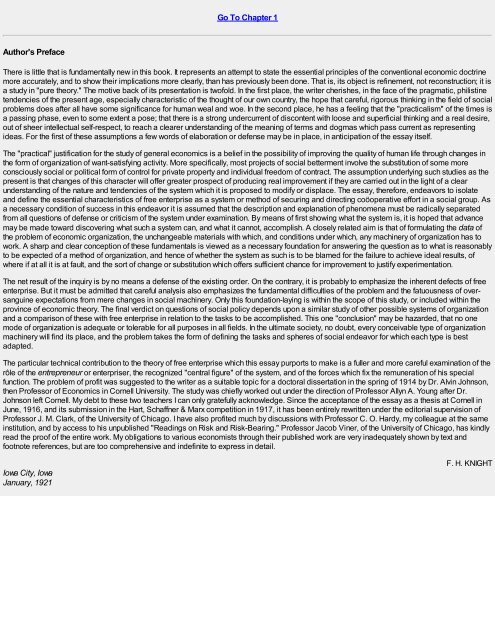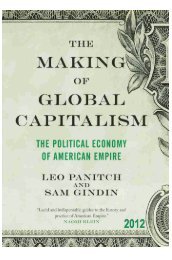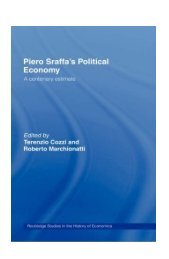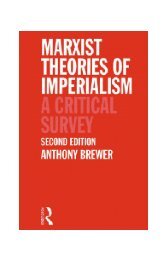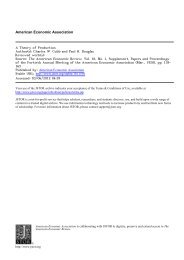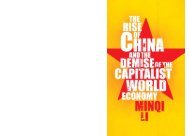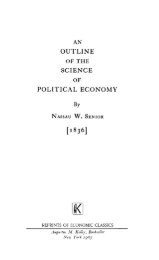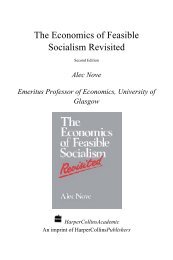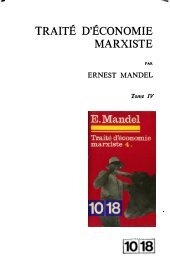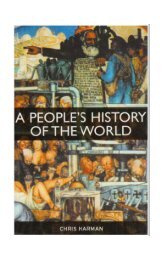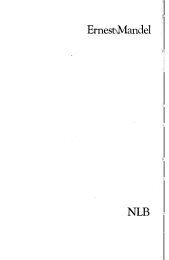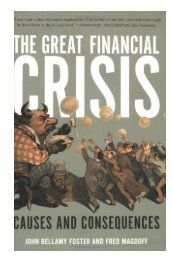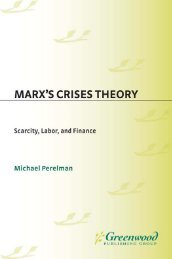Go To Chapter 1Author's PrefaceThere is little that is fundamentally new in this book. It represents an attempt to state the essential principles of the conventional economic doctrinemore accurately, <strong>and</strong> to show their implications more clearly, than has previously been done. That is, its object is refinement, not reconstruction; it isa study in "pure theory." The motive back of its presentation is twofold. In the first place, the writer cherishes, in the face of the pragmatic, philistinetendencies of the present age, especially characteristic of the thought of our own country, the hope that careful, rigorous thinking in the field of socialproblems does after all have some significance for human weal <strong>and</strong> woe. In the second place, he has a feeling that the "practicalism" of the times isa passing phase, even to some extent a pose; that there is a strong undercurrent of discontent with loose <strong>and</strong> superficial thinking <strong>and</strong> a real desire,out of sheer intellectual self-respect, to reach a clearer underst<strong>and</strong>ing of the meaning of terms <strong>and</strong> dogmas which pass current as representingideas. For the first of these assumptions a few words of elaboration or defense may be in place, in anticipation of the essay itself.The "practical" justification for the study of general economics is a belief in the possibility of improving the quality of human life through changes inthe form of organization of want-satisfying activity. More specifically, most projects of social betterment involve the substitution of some moreconsciously social or political form of control for private property <strong>and</strong> individual freedom of contract. The assumption underlying such studies as thepresent is that changes of this character will offer greater prospect of producing real improvement if they are carried out in the light of a clearunderst<strong>and</strong>ing of the nature <strong>and</strong> tendencies of the system which it is proposed to modify or displace. The essay, therefore, endeavors to isolate<strong>and</strong> define the essential characteristics of free enterprise as a system or method of securing <strong>and</strong> directing coöoperative effort in a social group. Asa necessary condition of success in this endeavor it is assumed that the description <strong>and</strong> explanation of phenomena must be radically separatedfrom all questions of defense or criticism of the system under examination. By means of first showing what the system is, it is hoped that advancemay be made toward discovering what such a system can, <strong>and</strong> what it cannot, accomplish. A closely related aim is that of formulating the data ofthe problem of economic organization, the unchangeable materials with which, <strong>and</strong> conditions under which, any machinery of organization has towork. A sharp <strong>and</strong> clear conception of these fundamentals is viewed as a necessary foundation for answering the question as to what is reasonablyto be expected of a method of organization, <strong>and</strong> hence of whether the system as such is to be blamed for the failure to achieve ideal results, ofwhere if at all it is at fault, <strong>and</strong> the sort of change or substitution which offers sufficient chance for improvement to justify experimentation.The net result of the inquiry is by no means a defense of the existing order. On the contrary, it is probably to emphasize the inherent defects of freeenterprise. But it must be admitted that careful analysis also emphasizes the fundamental difficulties of the problem <strong>and</strong> the fatuousness of oversanguineexpectations from mere changes in social machinery. Only this foundation-laying is within the scope of this study, or included within theprovince of economic theory. The final verdict on questions of social policy depends upon a similar study of other possible systems of organization<strong>and</strong> a comparison of these with free enterprise in relation to the tasks to be accomplished. This one "conclusion" may be hazarded, that no onemode of organization is adequate or tolerable for all purposes in all fields. In the ultimate society, no doubt, every conceivable type of organizationmachinery will find its place, <strong>and</strong> the problem takes the form of defining the tasks <strong>and</strong> spheres of social endeavor for which each type is bestadapted.The particular technical contribution to the theory of free enterprise which this essay purports to make is a fuller <strong>and</strong> more careful examination of therôle of the entrepreneur or enterpriser, the recognized "central figure" of the system, <strong>and</strong> of the forces which fix the remuneration of his specialfunction. The problem of profit was suggested to the writer as a suitable topic for a doctoral dissertation in the spring of 1914 by Dr. Alvin Johnson,then Professor of Economics in Cornell University. The study was chiefly worked out under the direction of Professor Allyn A. Young after Dr.Johnson left Cornell. My debt to these two teachers I can only gratefully acknowledge. Since the acceptance of the essay as a thesis at Cornell inJune, 1916, <strong>and</strong> its submission in the Hart, Schaffner & Marx competition in 1917, it has been entirely rewritten under the editorial supervision ofProfessor J. M. Clark, of the University of Chicago. I have also profited much by discussions with Professor C. O. Hardy, my colleague at the sameinstitution, <strong>and</strong> by access to his unpublished "Readings on <strong>Risk</strong> <strong>and</strong> <strong>Risk</strong>-Bearing." Professor Jacob Viner, of the University of Chicago, has kindlyread the proof of the entire work. My obligations to various economists through their published work are very inadequately shown by text <strong>and</strong>footnote references, but are too comprehensive <strong>and</strong> indefinite to express in detail.Iowa City, IowaJanuary, 1921F. H. KNIGHT
Part I, Chapter IThe Place of <strong>Profit</strong> <strong>and</strong> <strong>Uncertainty</strong> in Economic TheoryEconomics, or more properly theoretical economics, is the only one of the social sciences which has aspired to the distinction of an exact science.To the extent that it is an exact science it must accept the limitations as well as share the dignity thereto pertaining, <strong>and</strong> it thus becomes likephysics or mathematics in being necessarily somewhat abstract <strong>and</strong> unreal. In fact it is different from physics in degree, since, though it cannot wellbe made so exact, yet for special reasons it secures a moderate degree of exactness only at the cost of much greater unreality. The veryconception of an exact science involves abstraction; its ideal is analytic treatment, <strong>and</strong> analysis <strong>and</strong> abstraction are virtually synonyms. We havegiven us the task of reducing to order a complex mass of interrelated changes, which is to say, of analyzing them into uniformities of sequence orbehavior, called laws, <strong>and</strong> the isolation of the different elementary sequences for separate study.Sometimes the various elementary constituents of our complex phenomenon are met with in nature in isolation complete or partial, <strong>and</strong> sometimesartificial experiments can be devised to present them either alone or with attendant conditions subject to control. The latter is, of course, thecharacteristic procedure of physical science. Its application to the study of industrial society is, however, generally impracticable. Here we mustcommonly search for manifestations of the various factors in our complex, under varying associations, or rely upon intuitive knowledge of generalprinciples <strong>and</strong> follow through the workings of individual chains of sequence by logical processes.The application of the analytic method in any class of problems is always very incomplete. It is never possible to deal in this way with a very largeproportion, numerically speaking, of the vast complexity of factors entering into a normal real situation such as we must cope with in practical life.The value of the method depends on the fact that in large groups of problem situations certain elements are common <strong>and</strong> are not merely present ineach single case, but in addition are both few in number <strong>and</strong> important enough largely to dominate the situations. The laws of these few elements,therefore, enable us to reach an approximation to the law of the situation as a whole. They give us statements of what "tends" to hold true or "would"hold true under "ideal" conditions, meaning merely in a situation where the numerous <strong>and</strong> variable but less important "other things" which our lawsdo not take into account were entirely absent.Thus, in physics, the model <strong>and</strong> archetype of an exact science of nature, a relatively small <strong>and</strong> workable number of laws or principles tell us whatwould happen if simplified conditions be assumed <strong>and</strong> all disturbing factors eliminated. The simplified conditions include specifications as todimensions, mass, shape, smoothness, rigidity, elasticity <strong>and</strong> properties generally of the objects worked with, specifications usually quiteimpossible to realize in fact, yet absolutely necessary to make, while the "disturbing factors" are simply anything not included in the specifications,<strong>and</strong> their actual elimination is probably equally impossible to realize, <strong>and</strong>, again, equally necessary to assume. Only thus could we ever obtain"laws," descriptions of the separate elements of phenomena <strong>and</strong> their separate behavior. And while such laws, of course, never accurately holdgood in any particular case, because they are incomplete, not including all the elements in the case, yet they enable us to deal with practicalproblems intelligently because they are approximately true <strong>and</strong> we know how to discount their incompleteness. Only by such approximations,reached by dealing analytically with the more important <strong>and</strong> more universal aspects of phenomena, could we ever have attained any intelligentconception of the behavior of masses of matter in motion <strong>and</strong> secured our present marvelous mastery over the forces of nature.In a similar way, but for various reasons not so completely <strong>and</strong> satisfactorily, we have developed a historic body of theoretical economics whichdeals with "tendencies"; i.e., with what "would" happen under simplified conditions never realized, but always more or less closely approached inpractice. But theoretical economics has been much less successful than theoretical physics in making the procedure useful, largely because it hasfailed to make its nature <strong>and</strong> limitations explicit <strong>and</strong> clear. It studies what would happen under "perfect competition," noting betimes respects inwhich competition is not perfect; but much remains to be done to establish a systematic <strong>and</strong> coherent view of what is necessary to perfectcompetition, just how far <strong>and</strong> in what ways its conditions deviate from those of real life <strong>and</strong> what "corrections" have accordingly to be made inapplying its conclusions to actual situations.*1The vague <strong>and</strong> unsettled state of ideas on this subject is manifest in the difference of opinion rife among economists as to the meaning <strong>and</strong> use oftheoretical methods. At one extreme we have mathematical economists <strong>and</strong> pure theorists*2 to whom little if anything outside of a closed systemof deductions from a very small number of premises assumed as universal laws is to be regarded as scientific economics at all. At the otherextreme there is certainly a strong <strong>and</strong> perhaps growing tendency to repudiate abstraction <strong>and</strong> deduction altogether, <strong>and</strong> insist upon a purelyobjective, descriptive science. And in between are all shades of opinion.In the present writer's view the correct "middle way" between these extreme views, doing justice to both, is not hard to find. An abstract deductivesystem is only one small division of the great domain of economic science, but there is opportunity <strong>and</strong> the greatest necessity for cultivating thatfield. Indeed, in our analogy, theoretical mechanics is a very small section of the science of physical nature; but it is a very fundamental section, in asense the "first" of all, the foundation <strong>and</strong> prerequisite of those that follow. And this also may very well hold good of a body of "pure theory" ineconomics; it may be that a small step, but the first step, toward a practical comprehension of the social system is to isolate <strong>and</strong> follow out to theirlogical conclusion a relatively small number of fundamental tendencies discoverable in it. There is abundant need for the use of both deduction <strong>and</strong>induction in economics as in other sciences, if indeed the two methods are theoretically separable. As Mill has well argued*3 we must reasondeductively as far as possible, always collating our conclusions with observed facts at every stage. Where the data are too complex to h<strong>and</strong>le inthis way induction must be applied <strong>and</strong> empirical laws formulated, to be connected deductively with the general principles of "ethology" (we shouldnow say simply "human behavior"). Emphasis being laid on the provisos, in both cases, that in using deduction the conclusions must be constantlychecked with facts by observation <strong>and</strong> premises revised accordingly, while the empirical laws resulting from induction must in turn be shown tofollow from the general principles of the science before they can be credited with much significance or dependability, we see that there is littledivergence left between the two methods.*4The method of economics is simply that of any field of inquiry where analysis is in any degree applicable <strong>and</strong> anything more than mere description
- Page 4 and 5: possible. It is the scientific meth
- Page 6 and 7: drawn-out redistribution of energy
- Page 8 and 9: left after (a) interest, (b) insura
- Page 10 and 11: The fatal criticism of this procedu
- Page 12 and 13: sides of the controversy, in assumi
- Page 14 and 15: Part II, Chapter IIIThe Theory of C
- Page 16 and 17: ecause they give rise to no conflic
- Page 18 and 19: credits are equal. There is a sort
- Page 20 and 21: either superabundant, and consequen
- Page 23 and 24: Part II, Chapter IVJoint Production
- Page 25 and 26: on his business. It is obvious that
- Page 27: word "product" in the same meaning
- Page 30 and 31: that the owner of such property may
- Page 32 and 33: consumption, to secure a rising dis
- Page 34 and 35: difference between personal ability
- Page 36 and 37: limits its increase rises at the sa
- Page 38 and 39: amounts of agencies not freely repr
- Page 40 and 41: Part II, Chapter VIMinor Prerequisi
- Page 42 and 43: Clark School. "Monopoly" is a word
- Page 44 and 45: incapable of wielding to his own ad
- Page 46 and 47: automata, but we are not. At least
- Page 48 and 49: The practical limitation of knowled
- Page 50 and 51: to its conclusion, it seems that th
- Page 52 and 53:
should regard the probability for h
- Page 54 and 55:
themselves into an opinion of a pro
- Page 56 and 57:
equally probable alternatives; but
- Page 58 and 59:
It is particularly noteworthy that
- Page 60 and 61:
Part III, Chapter IXEnterprise and
- Page 62 and 63:
ecommenced at the beginning.We turn
- Page 64 and 65:
number of times. The allowance for
- Page 66 and 67:
Part III, Chapter XEnterprise and P
- Page 68 and 69:
esources are placed in an exposed p
- Page 70 and 71:
Pure profit is theoretically unimpu
- Page 72 and 73:
This distinction is also well recog
- Page 74 and 75:
call for the exercise of judgment i
- Page 76 and 77:
The uncertainty so far discussed in
- Page 78 and 79:
others. It will ordinarily be true
- Page 80 and 81:
e a brief examination into the mean
- Page 82 and 83:
And this even though the same men k
- Page 84 and 85:
economic conduct, and weighed again
- Page 93 and 94:
Frank H. Knight, Risk, Uncertainty,
- Page 95 and 96:
18. These national designations of
- Page 97 and 98:
dynamic economic changes are of thi
- Page 99 and 100:
2. This is intended as a statement
- Page 101 and 102:
of æsthetics (another form of "val
- Page 103 and 104:
Economics, vol. XVI, pp. 473 ff.) B
- Page 105 and 106:
57. See chapter VI.58. We may notic
- Page 107 and 108:
Economy, pp. 72 ff., where the same
- Page 109 and 110:
War, in particular, has wrought cha
- Page 111 and 112:
105. There is one important excepti
- Page 113 and 114:
time tendencies or with "static" ec
- Page 115 and 116:
24. Chapter V, the reader will reca
- Page 117 and 118:
virtue" of opiates. The latter at l
- Page 119:
68. Principles of Economics (1913),


